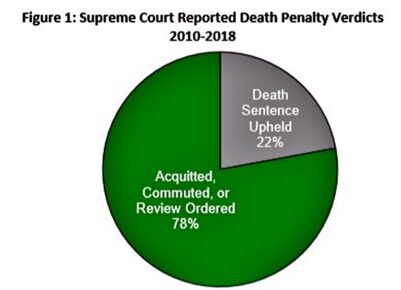Download a copy of the Pakistan Capital Punishment Study here: Pakistan Capital Punishment Study (FFR & Reprieve)
Between 2010 and 2018, Pakistan’s Supreme Court overturned 78% of death penalty cases, a report has revealed.
The Pakistan Capital Punishment Study, a two-year long study and analysis of the capital jurisprudence of the Supreme Court of Pakistan, reveals that:
- Of 310 reported capital judgments between 2010 and 2018, the apex court overturned death sentences in 78% of cases – either acquitting, commuting the sentence, or ordering a review.
- In 2018, the last year on record, the Supreme Court upheld the death penalty in only 3% of its reported capital cases.
- Pakistan has executed more than 500 people since 2014 – when a death penalty moratorium was lifted – with an average of two hangings per week.
- 28% of cases where the Supreme Court eventually overruled a death sentence involved a co-accused. In these 28%, one person had been sentenced to death at trial and the co-accused had been acquitted at trial – both on the same set of evidence.
- Almost 4688 people reside on Pakistan’s death row, making it one of the largest in the world.
- Since 2014, at least 13 prisoners have been executed after being on death row for over 20 years—the length of a life sentence.
The study also reveals that the Supreme Court frequently cites unreliable witness testimonies, involuntary or retracted confessions, insufficient or manipulated evidence and lack of motive of the accused as the primary reason for overturning death sentences. Additionally, the Supreme Court, in exercising its capital jurisdiction, raises serious doubts about the reliability of police investigation, particularly where there is an unexplained delay in registration of the first information report (FIR) and where the evidence appears to be planted, manipulated or otherwise doubtful.
The Supreme Court has upheld death sentences for lethal offences only—every judgment of a non-lethal offence ended with the Supreme Court overturning the conviction or commuting the death sentence. Despite this, lower courts continue to regularly impose death sentences for non-lethal offences.
Even for lethal crimes, the Supreme Court has established a presumption in favour of life imprisonment over the death penalty. Despite clear direction from the Supreme Court that the death penalty is not the ‘normal sentence’ for lethal crimes, lower courts fail to comply. Former Chief Justice Nisar noted that the failure to follow precedent was one of the chief issues plaguing Pakistan’s justice system.
The Supreme Court now recognizes a growing number of mitigating factors which counsel against a death sentence. These include: type and gravity of the offence, lesser participation by the accused, lack of premeditation, provocation, social and familial circumstances, partial compromise with the victim’s family, age of the accused, whether the accused was acting under the influence of an elder, mental state of the accused, capacity for reform and time spent on death row. The court has recognized that even a “single mitigating instance, available in a particular case, would be sufficient to put on guard the judge to not award the penalty of death but of life imprisonment.”
Sadaf Aziz, Director of Foundation for Fundamental Rights (FFR), said:
“These figures reveal a shocking inconsistency between trial practice and Supreme Court guidance. The devastating consequence of this is that prisoners can spend 10 years or more under the threat of execution before the Supreme Court decides that they should never have been sentenced to death in the first place. We need urgent reform before any more people are wrongly sentenced to death – or even executed.”
Maya Foa, Director of Reprieve, said:
“The Pakistan Capital Punishment Study clearly shows the progressiveness of the Supreme Court jurisprudence on this issue. Unfortunately, a large proportion of the capital cases that reach the Supreme Court are of people who were wrongly convicted, many of whom have languished for over a decade on death row. The trial courts should follow the guidance clearly set out by the Supreme Court and reserve the death penalty for only the most serious crimes, reducing the burden on the higher courts and the number of innocents on death row.”
Tim Moloney QC (Queen’s Counsel), a criminal law barrister at Doughty Street Chambers, said:
“This is a critical study that shines a light on Pakistan’s capital punishment system. It demonstrates that in a majority of capital cases, the Supreme Court is in the position of fixing errors made at the lower court level that have resulted in serious miscarriages of justice. It also identifies simple reforms that could be made to limit the number of people being wrongfully sentenced to death, increase efficiencies within the system, and ultimately reduce the burden on the Supreme Court.”
As a result of the study’s findings, the Foundation for Fundamental Rights and Reprieve have made the following recommendations:
- Adopt an immediate moratorium on executions pending a full review of the capital system;
- Establish a taskforce to examine the procedures in capital practice in the trial and High Courts to ensure fair and efficient administration of justice;
- Establish an accessible database of capital cases, divided by province and procedural posture;
- Ensure the right to effective counsel throughout the process in capital cases, including by training state-appointed lawyers in capital trials.
- Establish a mandatory right of appeal to the Supreme Court when a death sentence is confirmed by the High Court;
- Establish an administrative post-appeal review commission for capital cases where there is a serious issue of miscarriage of justice;
- Enact a law of compensation for wrongful convictions and set up a framework which allows individuals to access meaningful redress; and
- Remove the death penalty for non-lethal offences which do not meet the ‘worst of the worst’ standard, for example drug offences.
Download a copy of the Pakistan Capital Punishment Study here: Pakistan Capital Punishment Study (FFR & Reprieve)


